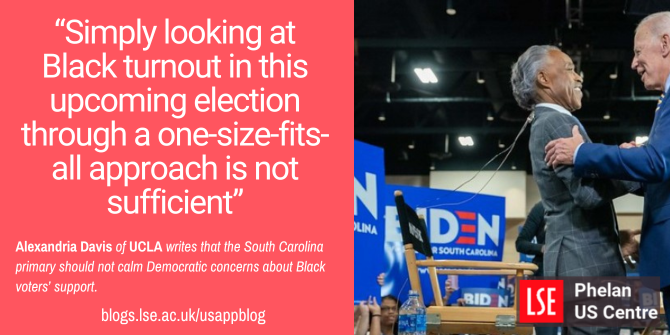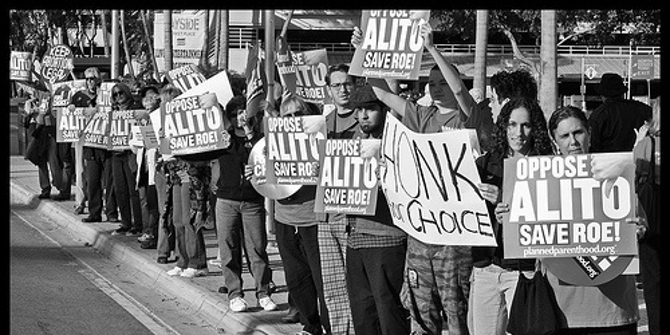 Earlier this month, President Joe Biden won the South Carolina Democratic primary with 96 percent of the vote. Alexandria Davis writes that despite Biden’s margin of victory, the results illustrate the Democratic Party’s complicated political relationship with Black voters. Reduced primary turnout, along with polling and voter data showing growing apathy, points to a growing negative feeling for the Democratic Party among Black voters going into the 2024 election.
Earlier this month, President Joe Biden won the South Carolina Democratic primary with 96 percent of the vote. Alexandria Davis writes that despite Biden’s margin of victory, the results illustrate the Democratic Party’s complicated political relationship with Black voters. Reduced primary turnout, along with polling and voter data showing growing apathy, points to a growing negative feeling for the Democratic Party among Black voters going into the 2024 election.
With over 125,000 votes – 96 percent of the total – President Joe Biden decisively won the Democratic Primary in South Carolina on February 3rd, his first victory in the 2024 election primary season. This primary is significant given that this is the first time South Carolina has led the Democratic primary process. President Joe Biden and his team advocated specifically for this state to go first, rather than New Hampshire, to support South Carolina’s “We Go First” campaign efforts. Additionally, the Biden campaign wanted to show that Democrats are prioritizing Black voters by allowing them early access to select their preferred Democratic nominee. These efforts show how the Democratic Party is taking heed of Black voters as a consistent voting bloc for the party. However, these efforts may not be enough and show the complicated political relationship between Black voters and the Democratic Party. Additionally, it foreshadows the potential emergence of apathy amongst Black voters in the 2024 Presidential election, which could prove detrimental for the Democratic Party’s electoral fortunes.
Underwhelming results from a pivotal primary
Looked at more closely, the South Carolina Democratic primary results are underwhelming despite Biden’s landslide victory. Only about 131,000 people turned out for the South Carolina primary far fewer than the 150,000 to 200,000 expected by Democratic officials in the lead up to the vote. Turnout was also 75 percent lower than in 2020. Although it is difficult to compare 2020 as it was a pivotal election during a global pandemic and a period of racial unrest, South Carolina still provides a warning of potential decreased turnout in the 2024 general election, especially in regards to Black voters.
Black voters in South Carolina may have made up about 76 percent of the early vote this year, which is 20 percent higher than in 2020. However, the Biden campaign should not breathe a sigh of relief just yet. This increase is likely due to focused campaign efforts by the Biden campaign in visiting South Carolina with prominent Black Democratic elected officials like Vice President Kamala Harris and House Minority Leader Hakeem Jeffries. Additionally, this early vote data has not been disaggregated to understand the different intersections of South Carolina Black voters and their support for Biden. Age, for example, could disaggregate this increase in early voting with it being very likely that older voters are at the helm of this increase. This assumption is based on recent research reporting that youth participation in primaries is conventionally low given young people are less committed to political parties than older individuals.
Black voters’ support for Biden cannot be reduced to singular statistics that paint the Black electorate as a monolith. Not disaggregating this support in South Carolina and other states could be consequential for Biden, especially given his 2020 presidential win was largely influenced by young people of color. More nuanced analysis using pre-existing data sources may paint a disparate picture for the future of the Biden campaign and 2024 Black voter turnout.
Negative feeling towards Biden among Black voters is growing
Voting data from the 2016 and 2020 American National Election Study provides additional insights into this potential negative sentiment toward voting amongst Black voters that could be looming over this election. In the 2020 American National Election Study, for example, viewing voting as a choice was significantly correlated with not voting amongst a sample of Black individuals, meaning the more a respondent viewed voting a choice the less likely they were to vote in the 2020 Presidential election. Additionally, about 20 percent of self-identified Black respondents reported not voting in the 2020 presidential election, while only about 16 percent Black respondents in 2016 reported not voting.

“South Carolina Democratic Party Convention” (CC BY-NC-SA 2.0) by Biden For President
To add more fuel to the fire, a New York Times poll last November reported negative sentiments toward President Joe Biden amongst Black voters, specifically citing his age, inability to fulfill campaign promises, the economy, and even Biden’s support of Israel in the Israel-Hamas conflict. In 2020, Biden specifically promised student debt relief, which is an important issue for Black voters as they are some of the highest debt borrowers. However, Black voters feel like Biden has not moved the needle enough on that issue and 49 percent of Black respondents think Biden’s policies have made no difference specifically for Black Americans. Black voters have also taken specific solidarity with Palestinians as oppressed people given the widespread imagery of the deaths of Palestinians on social media that they feel the Biden campaign has not acknowledged. Data on Black voters’ intended vote choice is even pointing to Trump gaining over 12 percent of Black voters’ support, which would be the greatest level support for a Republican presidential candidate in almost half a century. These negative feelings towards President Biden show evidence of vote capture, or the maintenance of a historic relationship between the Democratic Party and Black Americans despite conflicting views on policy issues, that could have negative repercussions for November.
These indicators for Black voters from pre-existing voter data and ongoing polls point to a growing negative feeling among Black voters going into this election. The feelings can manifest in support for likely Republican nominee, Donald Trump, despite his turbulent history with people of color. Even more concerning, these sentiments could result in Black voters not voting at all, similar to the low turnout of the 2016 Presidential election. Scholars and media pundits alike have not been able to come to a consensus to explain the rising sentiment of non-voting amongst the Black electorate. More research should be done to understand the behavioral and psychological consequences this could have on the Black electorate and their potentially changing position within the Democratic voter base.
Understanding Black voter apathy
A psychological understanding of these growing negative political sentiments is a potential solution to this growing problem amongst Black individuals. Borrowing from understandings of apathy in psychology and non-voting and Black voting behavior, Black voter apathy can potentially aid the discussion of what is going on in South Carolina and the United States alike. It can properly conceptualize the specific frustration or disillusionment Black voters have with Biden as well as the Democratic party specifically for not moving towards active solutions to the political issues Black Americans specifically face. Simply looking at Black turnout in this upcoming election through a one-size-fits-all approach is not sufficient, considering the tumultuous history Black Americans have had and continue to have with the right to vote. There is no current measure that encapsulates this historical context and psychological disposition to the right to vote, and one will be beneficial to instances like the South Carolina primary and beyond. Without this theory, Black Americans’ changing sentiments towards the Democratic Party will continue to grow unchecked and will create long-lasting damage to the American political system, especially with about 80 percent or more of Black voters supporting Democrats.
The Democratic party has offered attempts at showing Black voters that they matter to the party. This includes publicly claiming the record low unemployment of Black Americans and increased funding of historically black colleges and universities. Time will only tell what will unfold for the Biden campaign and Black voters in the 2024 general election. Early, more nuanced evidence, however, surrounding Black voters who are often discussed as the stronghold of American democracy should already present some alarm for Democrats and the American political world alike.
- Please read our comments policy before commenting.
- Note: This article gives the views of the author, and not the position of USAPP – American Politics and Policy, nor the London School of Economics.
- Shortened URL for this post: https://wp.me/p3I2YF-dCa







This article was informative and motivating
Go Alex!!!
Immigration is also starting to sway black votes away from Biden. Black population being only 13% of U.S. population suffer the most from an upsurge in illegals entering the country. Example jobs want to hire bilingual speaking people over english speaking citizens. Biden and democrats fighting amongst each other never addressed the problem until now it’s election time. A great American heroes once said “put your party before your party”. Both parties have failed. Biden was suppose to be a 4 year band aid, but democrats failed to develop anyone. Republicans still the good ole boy club, now just cowards scared to wash their hands of a conartist criminal. America is politically looking bad. Hopefully when we get to 2028 politics will return to normalcy.
Great article Alex.
So proud of you Alex! Great Article